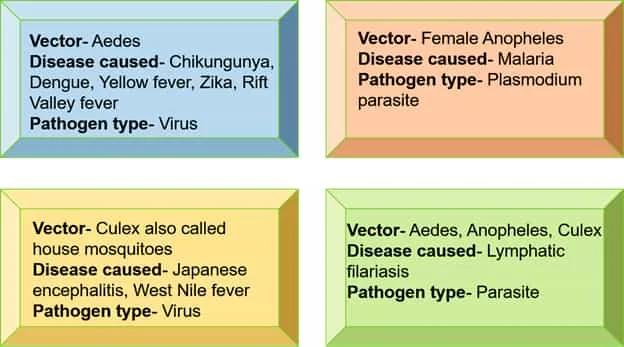1. Mosquitoes and their incessant buzz
From vexatious buzz to itchy bites and their exceptional ability to escape from our murderous actions and buzzing around again as if chanting what a loser we were.
Yes, mosquitoes have been a threat to humans as they are vectors or carriers of deadliest diseases that have affected people across the globe. There are over 3,000 species of mosquitoes in the world and at least 400 of them can be found in India.
Before the female mosquito dies, it can produce up to 500 eggs. The only pleasant thing about mosquitoes is that they do not live long, but in the meantime, they contribute to the death of millions of individuals over the world. Yes, millions you read it right, according to World health organization every year mosquitoes result in deaths of over 1 million people around the world.
Fun fact- Only female mosquitoes feed on blood, without which synthesis of yolk and development of eggs is implausible, while male mosquitoes get energy from plant nectar, rotten fruits and honeydew. Male mosquitoes are not able to suck blood from humans due to shorter mandibles. According to research published in the journal Frontiers in physiology, when male mosquitoes were allowed to feed on a blood-soaked cotton roll, they did not survive for too long. Thus concluding that blood is toxic for males.
Below is the list of commonly caused diseases which utilize mosquitoes as a vector.

2. What research says?
In the latest research by Baik and colleagues, it has been found that preference of light or darkness by mosquitoes is dependent on the spectrum, time of day, sex and species of mosquitoes.
Dengue and malaria are the most widely heard diseases associated with mosquitoes, with dengue being caused by day-biting (diurnal) Aedes aegypti. In contrast, malaria is caused by anopheles which targets the vulnerable host at night (nocturnal). Aedes mosquitoes are more active and attracted to light during the day and become inactive and hide in dark locations once they have had their blood meal. In contrast, Anopheles coluzzii, Anopheles gambiae are inactive and specifically avoid ultraviolet (UV) and blue light during the day.
3. Circadian rhythm and mosquito response towards the light
In a simple sense, the circadian rhythm is a 24-hour internal clock within almost every living organism which tells them when to do what irrespective of the external environmental conditions. These clocks are essential in determining the sleeping, feeding patterns and many more functions in all individuals, including humans.
However, these clocks can also become disrupted if natural external conditions are continuously manipulated, thus ultimately affecting once behavioural aspects. Similarly, in mosquitoes circadian clock functions to help diurnal/nocturnal mosquitoes in differentiating between day or night. While disruption of the clock by continuously exposing the mosquitoes towards artificial light for long hours confuses them and does not allow to distinguish between the day or night.
Thus, disruption of the circadian clock severely interferes with light-evoked attraction/avoidance behaviour, biting, flight and egg-laying activities in mosquitoes.
4. Why conditional differentiation of mosquito species occurs?
Throughout evolution, different organisms of the species have evolved to differentiate in their abilities to avoid competition for survival. Similarly, different mosquito species might have evolved to occupy unique time-related differences (diurnal and nocturnal), so they can reduce inter-species competition and increase their opportunity of biting, mating and overall existence. It has been found that multiple behavioural changes occur in mosquitoes with respect to time of the day, which includes flight activity, mating, egg-laying, and biting.
5. Why light-based approaches can be substantial to target mosquitoes?
Light-based strategies to control mosquitoes are relatively safer in comparison to toxic pesticides which are harmful to the environment. Moreover, mosquitoes and the disease-causing pathogens have become increasingly resistant towards currently available treatment regimen.
Thus, an environmentally friendly and innovative method against mosquito control is necessary. With the application of the light-based approach, specific species can be targeted if the timing and the light spectra used is efficiently monitored.
For example, if high-intensity UV light is employed during the day, it will be ineffective against nocturnal mosquitoes. However, the same approach, when utilized appropriately, has produced significant results. A research stated that an exposure of female anopheles mosquito (nocturnal) which causes malaria towards light up to 10 minutes during the night or dusk period can retard its biting and flying ability.
Thus, disruption of the circadian clock by using artificial light may be applied toward species-specific control of harmful diseases like dengue and malaria.
